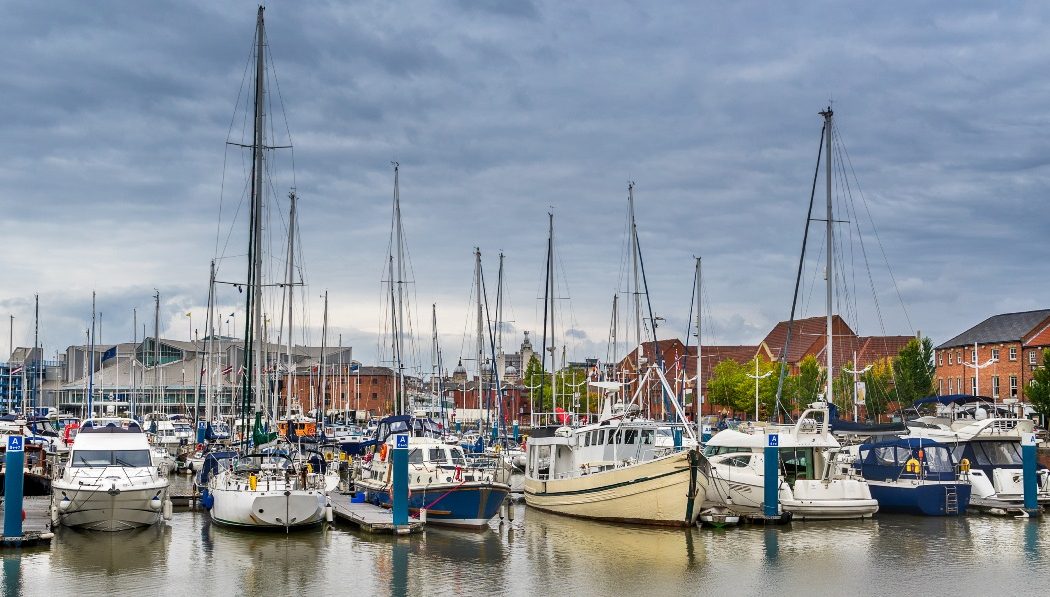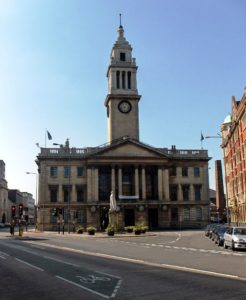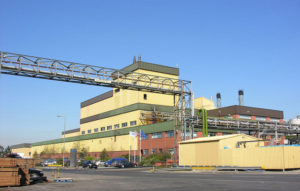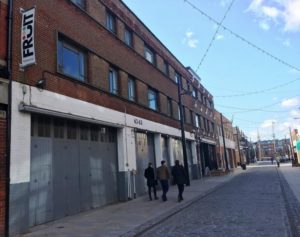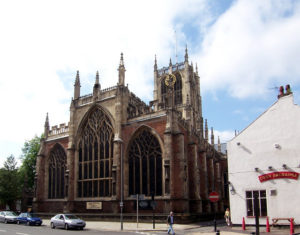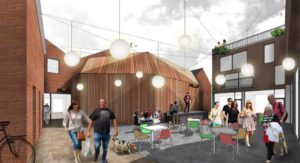How does one go about simultaneously 1) revitalizing a city’s economy, 2) repurposing and renewing old buildings, 3) bringing a city center back to life; and 4) inspiring young children to be both more creative and more entrepreneurial? Let’s go to Hull, England for the answer.
A little background first. Hull’s full name is Kingston upon Hull, but conversationally, it’s usually abbreviated to “Hull”. It’s in County Yorkshire, on the banks of the River Hull, where the river becomes the Humber estuary. Hull is about 25 miles (40 km) inland from the North Sea, and has a population of just over 260,000.
Hull was founded in the late 12th century, when the monks of Meaux Abbey needed a port where the wool from their estates could be exported. Over the years, Hull has been a market town, a military supply port, a trading hub, a fishing and whaling center and an industrial metropolis.
After suffering heavy damage in the Second World War (the “Hull Blitz”), Hull weathered a period of post-industrial decline, leading to high rates of poverty and crime, and a poor education system.
Just prior to the 2008 recession, the city enjoyed a burst of new retail, commercial, housing and public service construction spending. The global impact of the American banking fiasco brought that boom to a halt, but the city is once again on the mend. Witness:
In early December of 2017, children from a west Hull, England primary school used the regeneration of the city’s historic Fruit Market to unleash their creative and business skills.
Chiltern Primary School pupils are learning about the revitalizing project before they themselves go to Humber Street to speak to traders and complete a series of workshops.
The initiative – commissioned by Wykeland Beal, the brains behind the Fruit regeneration – gives pupils the chance to get creative and design their own products. Dominic Gibbons, Wykeland Group managing director, said: “It’s important the transformation of the Fruit Market creates a long-term legacy for the city, by combining physical, cultural and social regeneration.”
Back on October 31, 2017. plans were submitted to the Hull City Council for a £3.5 million redevelopment, including a revamp of Hull’s successful Fruit venue, as part of the latest major investment in Hull’s Fruit Market quarter.
The plans have been submitted by ID Architecture on behalf of the Fruit Market LLP, the joint venture formed by regeneration company Wykeland Group, homebuilder Beal Homes and Hull City Council, to regenerate the Fruit Market. Their brilliant “Restoration Economy“-style slogan is “regeneration for the next generation“.
A planning application was for the repair and redevelopment of 61-63 Humber Street which houses Fruit, including the creation of a new, purpose-built and sound-proofed multi-arts performance venue, accommodated partly within and also extending to the rear of the building.
The plans will ensure a sustainable, long-term future for one of the region’s most popular and innovative venues, by providing fit-for-purpose facilities as part of a completely refurbished and regenerated building which will become a hub for the creative arts.
The £1.2 million proposals for 61-63 Humber Street involve the restoration and reconfiguration of all three stories of the building, with a new gallery and café featuring a glazed frontage onto Humber Street and the unused and dilapidated upper floors repaired and refurbished to create flexible studios and work spaces for artists and craftspeople. The first floor will also feature a roof terrace above the performance venue.
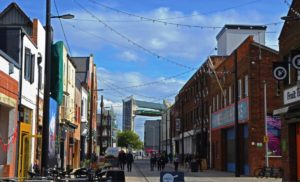 The planning application includes a further £2.3 million of development at the rear of 61-63 Humber Street. This will involve the creation of a paved outdoor performance area and gathering place within a courtyard at the rear of Fruit, with the last remaining smoke house in the center of Hull brought back into use as a pop-up bar/street food venue.
The planning application includes a further £2.3 million of development at the rear of 61-63 Humber Street. This will involve the creation of a paved outdoor performance area and gathering place within a courtyard at the rear of Fruit, with the last remaining smoke house in the center of Hull brought back into use as a pop-up bar/street food venue.
The courtyard would be “wrapped” by construction of a new building fronting onto Wellington Street with six ground-floor glazed units for shops, offices and workshops and 11 modern city living apartments over three further floors from the first floor, bringing additional life and vibrancy to the Fruit Market. New alleys will encourage a flow of people between Humber Street and Wellington Street via the courtyard.
Delivery of the redevelopment of 61-63 Humber Street is being aided by a grant secured from the Government’s Coastal Communities Fund to support the continuing regeneration of the Fruit Market waterside district.
Gibbons explained “These proposals represent the latest stage of the exciting rejuvenation of the Fruit Market. 61-63 Humber Street is a key building in the heart of the Fruit Market and has become established as the home of Fruit, which has played such an important part in Hull’s cultural renaissance.”
“This development will put Fruit on a sustainable footing with significantly improved facilities, enabling the staging of a wider range of events, within a completely refurbished and restored building,” he continued. “The upper floors will become flexible workspaces for artistic and creative entrepreneurs and small businesses, which will enhance Hull’s growing reputation as a centre for the creative industries and support the growth of employment within the cultural sector. The related development of the courtyard and the building facing Wellington Street will add further activity and energy, consistent with our vision for the regeneration of the Fruit Market as a unique, vibrant and creative quarter where people live, work and play.”
The proposals respect the unique heritage and character of the Fruit Market and have been developed in consultation with planning officers and fine-tuned following a pre-application meeting with Hull City Council’s Planning Committee.
In preparation for the proposed development, Wykeland Beal has already carried out work over the summer to prevent further deterioration of 61-63 Humber Street, including replacing all the roofs, installing new power supplies and removing asbestos
Wykeland Beal has consulted extensively with Hull City Council, the University of Hull and a wide range of cultural and artistic organizations, including Hull UK City of Culture 2017, Arts Council England, Creative and Cultural, Hull School of Art and Design and Freedom Festival, to develop a model for the creative work spaces on the upper floors of 61-63 Humber Street.
Gibbons said the aim was to learn from the success of the nearby Centre for Digital Innovation (C4DI) tech hub which provides a collaborative environment for hundreds of tech specialists and has been the catalyst for the launch and growth of many entrepreneurial digital businesses. He added: “We want to create a supportive environment where creatives can collaborate and innovate – in effect, a C4DI for the arts. Working with partners, we’re aiming to create a dynamic, self-sustaining hub for creative and cultural enterprises. This has the potential to create a significant number of new businesses and jobs and establish a legacy of cultural and creative capacity, building on the success of Hull’s year as UK City of Culture.”
Andy Balman, a Director of Ark Entertainments, which operates Fruit, The Welly and The Polar Bear venues in Hull, as well as the Hull Box Office website, said: “These plans offer a wonderful opportunity for Fruit to grow and have a sustainable, long-term future in Humber Street. We’re proud of what we’ve achieved, but we need to move to the next stage. We’ve worked closely with Wykeland Beal over the past couple of years to develop these plans to enable that to happen.”
He continued, “This development will give us a purpose-built, sound-proofed venue with excellent facilities, including improved stage, lighting and PA system. We’ll also have a fit-for-purpose back-stage area with two dressing rooms so performers can prepare for shows in comfort. The capacity will remain the same at around 300, but the improved facilities and versatility we can offer will make Fruit even more attractive to touring bands and other artists. It will also mean we can host a wider range of events, during the day as well as in the evening, and can use the courtyard for smaller-scale acoustic performances.”
Fruit has pioneered the cultural revival of the Fruit Market since opening in 2010 and Mr Balman said its unique character would not change. He added: “Fruit has developed a unique position in Humber Street and has built up a strong reputation for creativity and innovation. We don’t want to lose any of what makes Fruit so special. We’ll retain the bohemian, warehouse look, feel and vibe, but with better facilities. We’ll also be a key part of a building that will become a major hub for artistic and creative industries.”
Councillor Daren Hale, Deputy Leader of Hull City Council and Chair of the Fruit Market LLP, said: “The redevelopment of the Fruit Market has been a priority for the council for many years and it’s great to see these plans to further enhance this special place submitted. The area has been one of the biggest success stories of 2017 and, if approved, this build would offer a whole new dimension to the cultural hub. Thanks must again go to the Coastal Communities Fund for recognising this fantastic opportunity.”
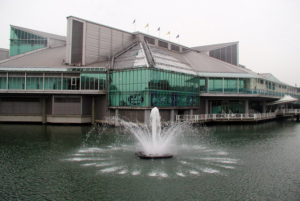
Prince’s Quay Shopping Centre, which was redeveloped on the old Prince’s Dock. Photo credit: Paul Glazzard via Wikipedia.
Martin Green, Director of Hull 2017, enthused: “I’m delighted to see further investment in what is rapidly becoming a real cultural hub, not only for the city, but for the wider region. The city needs spaces like this where creative people can come together to share ideas and collaborate. I’m sure that this newly developed space will enhance the creative offer in the city by providing the many talented people here with a purpose-built place to work.”
If approved, the planning application will unlock the latest significant investment as part of the £80m, long-term transformation of the Fruit Market.
Commercial investments in recent months include high-quality restaurants Ambiente Tapas, Butler Whites and Tapasya @ Marina; artisan chocolatier Cocoa Chocolatier and Patisserie; arts venue Humber Street Gallery; Humber Street Distillery Co gin bar; and vintage fashion brand Poorboy Boutique.
The Fruit Market’s commercial opportunities will be complemented by 101 new mews-style homes around private courtyards, and ground work for the residential development began in late 2017.
Regarding the schoolkids’ involvement, Beal added: “This is a really exciting project and a fantastic opportunity to nurture the entrepreneurs and creatives of the future. The children have a real hunger for knowledge and their enthusiasm is infectious. With all the creative ventures springing up in the Fruit Market, there could not be a better place for them to develop innovative ideas.”
On September 27, 2017, Humber Street won The Great Street Award at the Academy of Urbanism Awards. Accepting the award, Portfolio Holder for Economic Investment, Regeneration and Planning, Councillor Martin Mancey, said: “Humber Street is a vibrant and thoughtful refurbishment, with many commercial and social benefits and it’s fantastic to see that this has been recognised. The strong public-private sector partnership with Wykeland Beal has seen this area transform into a unique, vibrant, cultural quarter where people live, work and play. Humber Street has formed a core part of the City of Culture 2017’s success and it is yet another example of the Council and our partners delivering on our City Plan objectives.”
Academy of Urbanism Awards Chair, David Rudlin, said: “The recession brought misery to many places but some used it to their advantage by scaling back plans to a more local level. Humber Street Fruit Market did just that by cultivating local creative industries to kick-start the rejuvenation of this whole area, emanating from Humber Street. The city council, local businesses and developers have all worked together to produce a very impressive, vibrant street.”
In explaining why Hull won the award, the Academy of Urbanism recognized that:
- Humber Street forms the spine of the long-term regeneration of Hull’s Fruit Market new urban village. The project so far has worked with the grain and character of the area with an exemplary form of public/private partnership;
- The industrial buildings have been adapted successfully to the present a mix of vibrant uses, whilst retaining their original robust character;
- The Humber Street Partnership has created an environment for people of all social backgrounds and ages;
- 20% of the finished floor space will be offered at affordable rents, which encourages start-ups and galleries;
- The Amphitheatre venue, with views over the Humber Estuary, supports events such as Humber Street Sesh and the Freedom Festival;
- C4DI has been a great incubator for business and the rest of Humber Street seems set to follow this success; and
- A Coastal Communities grant was used in 2014 to install new flood defenses to protect the whole area and unlock development spaces.
Dominic Gibbons said: “This award is a tremendous recognition of the exciting progress that has been made in making Humber Street the heart of the new Fruit Market urban village, at the forefront of Hull’s remarkable renaissance. It’s also a tribute to the power of the public and private sectors working in true partnership. The strategic and sympathetic approach we have taken to the rejuvenation of the Fruit Market can become a template for successful urban renewal.”
The Academy of Urbanism brings together thinkers and practitioners involved in the social, cultural, economic, political and physical development of villages, towns and cities across Great Britain, Ireland and Europe. The Urbanism Awards are the Academy’s primary platform for recognizing the best, most enduring or most improved urban environments.
Featured photo of Hull’s marina via Adobe Stock. All other photos courtesy of Wykeland Group. All renderings courtesy of ID Architecture.
See Hull Daily Mail article by Phil Winter.

